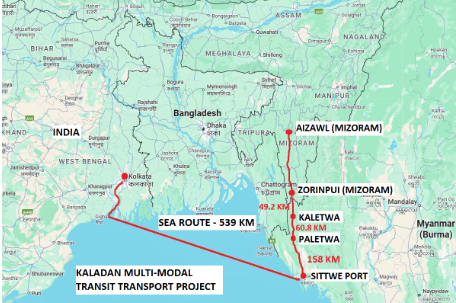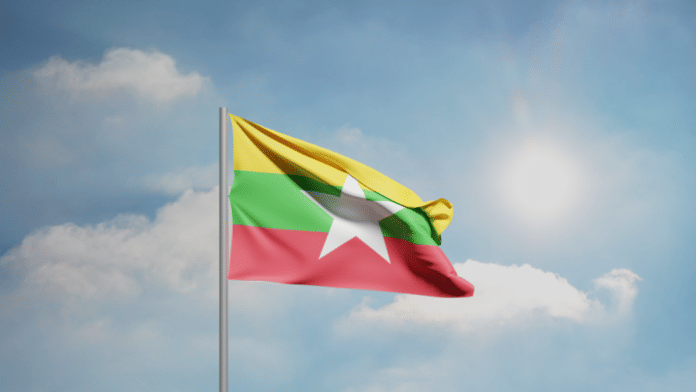Thank you dear subscribers, we are overwhelmed with your response.
Your Turn is a unique section from ThePrint featuring points of view from its subscribers. If you are a subscriber, have a point of view, please send it to us. If not, do subscribe here: https://theprint.in/subscribe/
Once again Myanmar is struggling to establish democracy as the world watches in Aung San, a prominent Burmese nationalist and revered leader who played a pivotal role in ending British colonial rule before his assassination. After gaining independence, the country enjoyed the initial phase of a democratic government till 1962 when the first military coup took place in 1962, when General Ne Win and the military overthrew the civilian government and established direct military rule.
The second phase of military rule largely known as ‘Constitutional Dictatorship phase’ began in March 1974. In this year, General Ne Win introduced a new constitution and held the first national election under it. Although the military Junta formally transferred power to an elected government after the election, it was essentially a symbolic move— he merely transferred power to himself and became the President. The military thus continued to dominate the country under the guise of democracy, consolidating authority within a single party. Between 1962 and 1988, three national elections were conducted—in 1974, 1978, and 1981—but these served only as façades of democracy, as real power remained firmly in military hands. The military has ruled Myanmar for nearly 54 years (from 1962 to 2011, and again from 2021 to the present), along with several periods under military-backed governments.
Perpetual Military Rule
Each time the military regime pledges to hold free and fair elections, the main political parties boycott the process, resulting in predictable outcomes that return power to the Junta by default. Military rule in Myanmar has been marked by repeated constitutional amendments and legal manipulations designed to entrench its authority and legitimise its continued dominance.
Until 2011, Myanmar remained under the firm control of the military Junta. The situation began to change when the National League for Democracy (NLD), led by Aung San Suu Kyi, the nation’s most prominent pro-democracy leader, won the elections in November 2015. However, the military retained considerable authority under the 2008 Constitution, which barred Suu Kyi from assuming the presidency. To enable her leadership, the position of State Counsellor was created, allowing her to effectively head the government despite constitutional restrictions. In the last general elections in 2020, NLD secured a landslide victory, winning a total of 396 seats across both houses (138 in the upper house and 258 in the lower house). This was well above the 322 required for a parliamentary majority. The military-backed Union Solidarity and Development Party (USDP) was second, winning a total of 33 seats across both houses. But the Junta seized power in a military coup on 1 February 2021, alleging widespread voter fraud in the 2020 general elections.
For over seven decades, Myanmar has been ravaged by civil war, but this 2021 coup drastically transformed the conflict’s dynamics. It fuelled the rise of new armed movements and bolstered long-standing Ethnic Armed Organisations (EAOs) that have resisted military rule for generations. Today, over 25 armed organisations remain active. Once again, after four years under military rule, the Junta has announced plans to hold elections beginning in December 2025.
Democracy in Myanmar remains unattainable without amending certain provisions of the 2008 Constitution that contradict its fundamental democratic principles. Article 59(f) of Chapter III disqualifies any individual from the presidency if their spouse or children are foreign citizens. This clause effectively bars Aung San Suu Kyi— married to Michael Aris, a British citizen—from holding the presidency. Her continued detention further symbolises the Junta’s suppression of democratic leadership and its unwillingness to allow genuine political reform. Articles 109(b) and 141(b) in Chapter IV, entitled “The Legislature,” state that 25% of the seats in both houses (110 out 440 in Pyithu Hluttaw and 56 out of 224 in Amyotha Hluttaw) of the Parliament are reserved for the military. With such provisions in place, sustaining democracy in Myanmar remains highly unlikely, even if elections are held and a so-called democratic government is established.
Elections Amid Conflict: The Present Political Scenario
The Junta now controls less than 21% of Burma’s territory. In areas liberated from the military Junta, resistance forces have established local governance systems, law enforcement institutions, schools, and health infrastructure to support local communities.
The Junta’s plan to conduct elections from December 2025 is widely seen as unrealistic and illegitimate. Having long committed atrocities amounting to war crimes and crimes against humanity, Myanmar’s military lacks both the credibility and capability to oversee a democratic process. Decades of repression—marked by the detention of opposition leaders and the banning of their parties—have fostered a climate of fear incompatible with free or fair elections. Further tightening control, the Junta enacted a law on 30 July criminalising any criticism of the electoral process, prohibiting speech, organisation, or protest deemed disruptive to the elections.
Significant portions of Myanmar remain beyond military control—a fact recently admitted by Junta chief Senior General Min Aung Hlaing. The regime’s so-called nationwide census, ostensibly intended to prepare voter lists, was reportedly exploited as a counterinsurgency measure to identify dissidents and forcibly recruit soldiers. Officials later conceded that the census had reached only 145 of the country’s 330 townships, covering less than half the nation, further exposing the Junta’s limited authority and administrative reach.
Junta authorities have since stated they will hold voting in over 270 townships, first on December 28 in 102 townships mostly under military control, then on an unspecified date in January in another 172 townships, primarily where the military has either limited or no control. On August 1, the Junta declared martial law in over 60 townships largely where the military has no control, and in which voting seems unlikely to be held.
China’s direct Interference in Myanmar
China views Myanmar primarily as its strategic gateway to the Bay of Bengal, often overlooking the atrocities faced by the country’s people in pursuit of its geopolitical interests. It appears reluctant to see stability return to the heart of South Asia, fearing that a peaceful and independent Myanmar could weaken its influence and diminish its strategic access to the Bay of Bengal. Its flagship Kyaukphyu port project in Rakhine State offers Beijing strategic access to the Indian Ocean, bypassing the vulnerable Malacca Strait.
What can India do to ensure stability in Myanmar

Sharing a 1,643 km border with India’s northeastern states and positioned at the gateway to ASEAN nations, Myanmar holds significant strategic importance for India. Myanmar is the crucial part of New Delhi’s ‘Act East’ and ‘Neighbourhood First’ Policies.
Since the signing of the India-Myanmar trade agreement in 1970, bilateral trade has grown steadily. India is the fourth largest trading partner of Myanmar. The bilateral trade stands at US$2.1 billion in 2024-25 which includes India’s export of over US$614 million and import from Myanmar of around US$1533 million. As per Govt. of Myanmar’s statistics, India is presently the eleventh largest investor with an approved investment of US$782.821 million by 39 Indian enterprises, out of the total estimated investments of US$ 96.05 billion from 53 countries (as on 31 March 2025).
New Delhi should expedite ongoing initiatives such as the Kaladan Multimodal Transit Transport Corridor (KMTTC) and the India–Myanmar–Thailand Trilateral Highway, among others. India must also continue providing humanitarian assistance to Myanmar, as it has consistently done in the past.
Although not a member of ASEAN, India holds the status of a ‘Dialogue Partner’ and should work closely with ASEAN nations to encourage engagement with Myanmar’s ethnic groups and support efforts toward a stable and inclusive government. Furthermore, New Delhi should revitalise BIMSTEC cooperation, leveraging Myanmar’s membership in both ASEAN and BIMSTEC to strengthen regional stability and connectivity.
Analysis
To ensure free and fair elections and safeguard the survival of any future democracy, Myanmar’s military leadership must recognise that democracy, in its true sense, means governance by the people and for the people. The Constitution must be reformed to place power in the hands of citizens, rather than being manipulated to preserve military dominance. As of now, the situation is grim for the restoration of full democracy. At best, Myanmar may get a military-backed elected government, as was the case in 2010 when the military-backed USDP was formed during the military regime called the State Peace and Development Council (SPDC). Regardless of the outcome of the upcoming elections, India must maintain consistent engagement with Myanmar’s government to ensure border stability and curb China’s growing influence in the region.
Col Mohinder Pal Singh, PhD is Director of AMAS Training . Views expressed are personal.
These pieces are being published as they have been received – they have not been edited/fact-checked by ThePrint.



Indian govt should encourage trade investment and infrastructure in Myanmar . To enhance its relation through people- to-people ties. As Myanmar is strategically important for India to counter china. As india provide annual assistance grants to it’s neighbours through ‘neighbours first’ policy no matter which regime going to ruled in that state.
Thanks for sharing depth knowledge and show broad vision sir.
Helpful in understanding the Myanmar political and military scenario
Nice viewpoint saab
Very informative article sir, it gives much needed clarity on the Myanmar’s situation & India’s stance, especially in balancing democratic relations, regional stability & countering CHINAs growing influence in the region.
Very informative and broad vision of Myanmar future ,Nice explanation sir
Well structured information and recommendations given. Good analysis of the situation sir